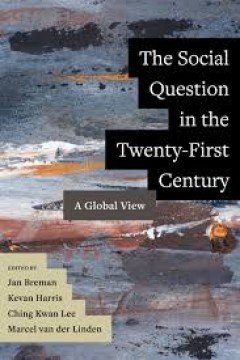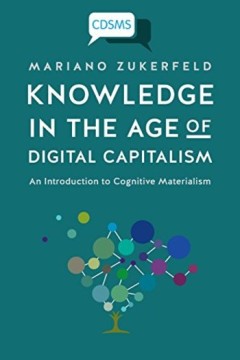Filter by

The unity of the capitalist economy and state
Geert Reuten's The unity of the capitalist economy and state offers a systematic exposition of the capitalist system. Outlining the economic and state institutions and processes that sustain capitalism, Reuten shows how the capitalist economy and state inevitably constitute a unity. Readership: Scholars and advanced students in political economy, economics, political science, social geography, …
- Edition
- -
- ISBN/ISSN
- 9789004392809
- Collation
- vi, 727p. : ill.
- Series Title
- -
- Call Number
- 330.122 REU t

Socialism, capitalism and alternatives: area studies and global theories
In 1989 the Berlin Wall came down. Two years later the Soviet Union disintegrated. The collapse of communism in Eastern Europe and the Soviet Union discredited the idea of socialism for generations to come. It was seen as representing the final and irreversible victory of capitalism. This triumphal dominance was barely challenged until the 2008 financial crisis threw the Western world into a st…
- Edition
- -
- ISBN/ISSN
- 9781787353824
- Collation
- xvii, 234 p. :
- Series Title
- -
- Call Number
- 330.9 SOC s

Crisis states: governance, resistance & precarious capitalism
This is an age of crisis: economic, political, environmental, and social. Yet the nature of contemporary crisis is often misunderstood. Crisis, rather than being accidental or episodic – as is too often assumed – has been a regular feature of state practice in the neoliberal austerity regimes of contemporary capitalism. In this timely work Jeff Shantz gives special attention to the particul…
- Edition
- -
- ISBN/ISSN
- 9780988234086
- Collation
- 82 p.; 22 cm.
- Series Title
- -
- Call Number
- 320.57 SHA c

Democracy and power: the Delhi lectures
"Noam Chomsky visited India in 1996 and 2001 and spoke on a wide range of subjects, from democracy and corporate propaganda to the nature of the world order and the role of intellectuals in society. He captivated audiences with his lucid challenge of dominant political analyses, the engaging style of his talks, and his commitment to social equality as well as individual freedom. Chomsky’s ear…
- Edition
- -
- ISBN/ISSN
- 9781783740949
- Collation
- 1 online resource (xviii, 171 pages)
- Series Title
- -
- Call Number
- 327.1 CHO d

Incorporating the digital commons corporate involvement in free and open sour…
The concept of ‘the commons’ has been used as a framework to understand resources shared by a community rather than a private entity, and it has also inspired social movements working against the enclosure of public goods and resources. One such resource is free (libre) and open source software (FLOSS). FLOSS emerged as an alternative to proprietary software in the 1980s. However, both the …
- Edition
- -
- ISBN/ISSN
- 9781912656431
- Collation
- xiv, 143p.: ill.
- Series Title
- -
- Call Number
- 005.8 BIR i

Social question in the twenty-first century: a global view
Want, disease, ignorance, squalor, and idleness: first recognized together in mid-nineteenth-century Europe, these are the focus of the Social Question. In 1942 William Beveridge called them the “giant evils” while diagnosing the crises produced by the emergence of industrial society. More recently, during the final quarter of the twentieth century, the global spread of neoliberal policies …
- Edition
- -
- ISBN/ISSN
- 9780520302402
- Collation
- xii, 266 pages : illustrations, maps ; 23 cm
- Series Title
- -
- Call Number
- 306.3 BRE s

Transformations in twentieth century Korea
This edited collection traces the social, economic, political, and cultural dimensions of Korea’s dramatic transformation since the late nineteenth century. Taking an interdisciplinary approach, the chapters examine the internal and external forces which facilitated the transition towards industrial capitalism in Korea, the consequences and impact of social change, and the ways in which Korea…
- Edition
- -
- ISBN/ISSN
- 9780203968277
- Collation
- xiii, 380p. : ill.
- Series Title
- -
- Call Number
- 330.95195043 TRA t

Knowledge in the age of digital capitalism : an introduction to cognitive mat…
Knowledge in the Age of Digital Capitalism proposes a new critical theory concerning the functioning of capitalism and how we consider knowledge and information. This ambitious book systematically and lucidly introduces contemporary phenomena into the framework of cognitive materialism to address some of the great themes of the social sciences: knowledge, exploitation and social class in an acc…
- Edition
- -
- ISBN/ISSN
- 9781911534273
- Collation
- ix, 261p. : ill.
- Series Title
- -
- Call Number
- 303.4833 ZUK k
 Computer Science, Information & General Works
Computer Science, Information & General Works  Philosophy & Psychology
Philosophy & Psychology  Religion
Religion  Social Sciences
Social Sciences  Language
Language  Pure Science
Pure Science  Applied Sciences
Applied Sciences  Art & Recreation
Art & Recreation  Literature
Literature  History & Geography
History & Geography